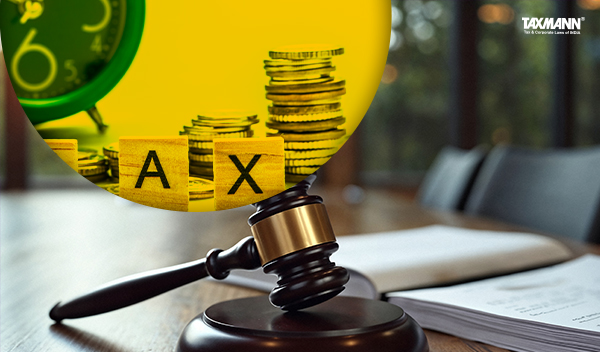FA 2022 Amendment Allowing Discontinuation of Section 80DD Deposits Couldn’t Be Applied Retrospectively | SC
- Blog|News|Income Tax|
- 3 Min Read
- By Taxmann
- |
- Last Updated on 19 November, 2024

Case Details: Ravi Agrawal vs. Union of India - [2024] 168 taxmann.com 320 (SC)[20-08-2024]
Judiciary and Counsel Details
- B.V. Nagarathna & Nongmeikapam Kotiswar Singh, JJ.
Facts of the Case
Section 80DD deals with the payment of an annuity of a lump sum amount for the benefit of a dependant, a person with a disability, in the event of death of the individual or the member of a Hindu Undivided Family (HUF) in whose name the subscription to the scheme stipulated in the said provision has been made. The Parliament amended section 80DD by virtue of the Finance Act 2022, with effect from 1-4-2023. Consequently, on attaining the age of 60 years or more by an individual subscriber or a member of a HUF, the payment or deposit to the scheme envisaged under section 80DD could be discontinued, and the monetary benefit that would have accumulated could be made use of.
The assessee submitted that the amendment ought to be made retrospective as the same was with effect from 1-4-2023 to the existing policies as it would benefit a large number of subscribers who were interested in making use of the benefit of such policies for the benefit of the disabled persons on turning 60 years of age. An option could be reserved for the subscribers to benefit from the amendment regarding policies made much prior to 2014, as in the said year, such policies had been discontinued.
He contended that if the amendments were given a retrospective effect, many subscribers, as well as disabled persons, would benefit, and hence, the concerns of the assessee being purely in the public interest might be considered, and relief might be granted.
Considering the Public Interest involved, the assessee filed a writ petition under Article 32 of the Constitution of India as a Public Interest Litigation before the Supreme Court of India.
Supreme Court Held
The Apex Court held that it was difficult to accept the plea made by the assessee to the effect that the amendment made to section 80DD be applied retrospectively to policies that were taken prior to 2014 so that the benefit of the amendment is given to those subscribers also. The whole object of Jeevan Adhar’s Policy was to benefit disabled persons by making provisions for the subscriber after his demise.
The concern and apprehension of a caregiver or subscriber of a policy for a disabled family member or other person for whose benefit the policy is taken after the demise of the caregiver is of utmost significance. It is only with that object that the caregiver or a subscriber would take such a policy so that he would not leave a disabled person in the lurch on his demise.
If that is the object of the policy, then the subscriber or the caregiver of the subscriber should not be given the liberty to discontinue the policy during his lifetime upon attaining 60 years of age. That would only go against the object with which the policy has been taken and against the beneficiary’s interest, namely, a disabled person.
The plea for retrospective operation of the amendment was not in the interest of the disabled persons, nor can this Court give a retrospective operation to the amendment. This was particularly concerning because an insurance contract is, in a sense, a commercial contract, having specific terms and conditions, and the sub-stratum of the contract cannot be removed by giving a retrospective operation to the amendment. The benefit under section 80DD would have been availed by the subscribers when they subscribed to the policy.
Accordingly, the writ petition was disposed of.
Disclaimer: The content/information published on the website is only for general information of the user and shall not be construed as legal advice. While the Taxmann has exercised reasonable efforts to ensure the veracity of information/content published, Taxmann shall be under no liability in any manner whatsoever for incorrect information, if any.



 CA | CS | CMA
CA | CS | CMA
